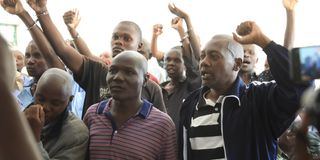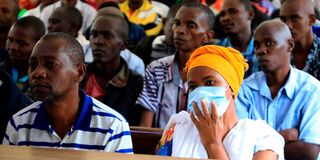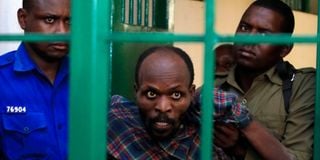
Paul Mackenzie (left) and co-suspects outside the Shanzu Law Courts on September 18, 2023
| Kevin Odit | Nation Media GroupKilifi
Premium
Inside Paul Mackenzie's 'White House' at Shimo la Tewa
The prime suspect in the Shakahola deaths, Paul Mackenzie, has claimed he survived on water alone for eight days when he became distrustful of the food served to him in prison.
In a detailed account of life in a solitary cell dubbed 'White House' at Shimo la Tewa Maximum Prison, the controversial preacher, who has been linked to the deaths of more than 400 of his alleged followers, claims his life is in danger.
The Kenya National Commission for Human Rights (KNHCR) report, filed at the Shanzu magistrate's court, says Mackenzie refused to eat from August 4, claiming he was suspicious about why he was being served a meal of potatoes and 'mchicha' (traditional vegetables) that was different from what other inmates were being served.

Shakahola cult leader Paul Mackenzie (in pink) is pictured with some of his followers at the Shanzu Law Courts in Mombasa County on May 2, 2023.
"He claims that he survived on water for a period of eight days while the food was being brought in, but refused to eat because of trust issues. He cited one incident where he refused some food distributed by a prisoner, the day shift officer allegedly asked the prisoner if Paul wouldn't eat it, to give it to him to eat.
"Paul alleged that the inmate refused and poured it into the trenches and then proceeded to serve the officer another plate of food," says the report filed by KNHCR lawyer Faiza Musa.
The 'White House' was found to be a single house, away from where other detainees are kept. The water he survived on came from a tap in this cell, according to the report.
Mackenzie agreed to eat on the ninth day after raising the issue in court and having a doctor present when he was served his meal in prison.
The report was the result of an investigation by the KNCHR ordered by Senior Principal Magistrate Yusuf Shikanda into allegations of ill-treatment of Mackenzie and nine other suspects in the Shakahola deaths. The order was made on August 10.
In its findings, the national human rights watchdog concluded that the suspects' rights had been violated while in detention.
The other nine suspects were arrested between April and June this year in connection with the deaths of alleged members of the Good Life International Church, which is linked to Mackenzie.
According to the findings, Mackenzie told the commission that he was being subjected to psychological torture in detention, as he also alleged that there had been threats on his life.
Mackenzie also complained of being held in solitary confinement and being denied visits and phone calls to his family.
"When it rains, the 'White House' leaks, the floor gets wet (and) there is no natural drainage, so you stay on the wet part of the floor until it dries itself, which creates unsuitable conditions," he told the commission.
He stated that he suffers mental anguish and feels mentally tortured as he is not allowed to speak to anyone. He also claimed that he could not leave his cell, according to the report.

Six people believed to be cult leader Paul Mackenzie followers at a Shanzu court in Mombasa County on April 27, 2023.
His other concerns at the time of the investigation were that he had not been allowed to shave despite his request, that his room was infested with lice, bedbugs and ants, and that he had never been questioned or his statement recorded since his arrest.
He claims that he was not allowed to bathe for three days.
When questioned by the commission, the prison authorities stated that they were operating within the Prisons Act, Cap 90, and that there was nothing personal against Mackenzie and his co-suspects.
KNHCR says it interviewed the officer in charge, Kassim Kimuyu, who said the decision to hold Mackenzie separately was made by the court to prevent him from inciting other inmates to fast.
"He cited an incident where the group resorted to fasting because Paul had instructed them to do so. He also said that the prison authorities had realised that he was the source of orders and that his followers obeyed him. Kassim said that one day his officers went to the cells and found them asleep and when they questioned them they were told "Mkubwa amesema tulale" (the boss told us to sleep). Mkubwa means Paul Mckenzie," the report said.

Suspected Kilifi cult leader Paul Mackenzie (right) and some of his followers protest detention without trial at the Shanzu Law Courts on August 1,2023. The defendants chanted the slogan 'Haki Yetu' as soon as they realised that the state was going to make another application to keep them in custody for another 47 days.
The prison also denied allegations that he had been denied visits, saying the visitation book clearly showed that he had been visited by his family, that he had been allowed to make several phone calls, and that all inmates and remand prisoners had broken the law and were there for rehabilitation. They denied ever threatening to kill Mackenzie.
However, the KNHCR pointed to a number of acts and omissions by the Prison Warders, and by extension the State, which it said demonstrated a typical case of ill-treatment and misconduct by some prison officers.

Pastor Paul Mackenzie and his alleged 29 associates at the Shanzu Law Courts during the mention of the case in this file photo.
The rights watchdog said investigating police officers are supposed to uphold human rights principles and standards for detainees.
"From the above investigations and findings, it is the opinion of the Commission, on the balance of probabilities, that the allegations made by Makenzie fall within the category of ill-treatment," said the report, submitted on 18 September.
It added: "The prison officers are verbally abusing and insulting the prisoners in the Shakahola matter, which is causing enormous distress and psychological distress and anxiety.
Mackenzie and nine other accused are being held in Shimo la Tewa, Malindi and Kilifi prisons awaiting court orders on their charges. They are expected back in court on 12 October.
Among other human rights violations, the report states that detainees were held in deplorable conditions, including overcrowding, lack of bedding and clothing, and lack of due process.
The commission also found that detainees in all three prisons were denied the right to communicate with family members, as required by law, and that the visiting section prevented communication with their visitors.

Mr Fredrick Karimi, one of the suspects accused alongside Pastor Mackenzie, inside the courtroom during the mention of their case at the Shanzu Law Courts in Mombasa on June 14.
"The KNCHR found subtle discrimination against the Shakahola detainees. They claimed that officers were informed that the prisons had their own rules and that they would only be recognised after conviction. This could be true, as their cells did not have televisions and/or radios like the other cells," the report said.
The government, through the prison service, was accused of failing to conduct effective investigations into alleged violations of freedom from torture and cruel, inhuman or degrading treatment or punishment of detainees.
According to the Commission, this violates Kenya's obligations under Articles 25 and 29 of the Constitution and Articles 1 and 2 of the United Nations Convention against Torture and Other Cruel, Inhuman or Degrading Treatment or Punishment (UNCAT).
In addition to the Shakahola death suspects and prison officials, the Commission's team informed the Court that it had conducted general and individual interviews with other detainees held on terrorism-related charges.
The nine other detainees are Smart Mwakalama, Titus Munyao, John Mark, Robert Katana, Alfred Kasena, Gedion Mbithi, Stephen Ominde, Collines Kabae and Erick Omollo.
The investigations were ordered following earlier submissions to Senior Principal Magistrate Shikanda by Mackenzie's lawyer, Wycliffe Makasembo, regarding human rights violations at the prison.
In its report, the commission suggested that the court conduct monthly monitoring visits to the three prisons where the accused are being held.





